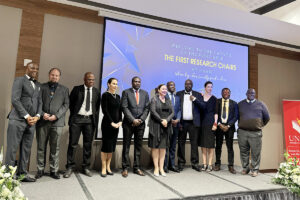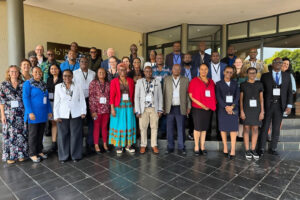The University of Namibia (UNAM) and the National Planning Commission (NPC), signed a Memorandum of Understanding (MOU), this month, to equip 100 government officials with critical project management skills.

The the training will be facilitated through the Namibia Business School (NBS) in close cooperation with the Project Management Institute of Namibia and the Performance Delivery Unit (PDU). This significant partnership marks the beginning of a strategic collaboration aimed at improving the ability of government officials responsible for the coordination and delivery of national development projects specifically the Sixth National Development Plan (NDP 6).
Speaking at the signing ceremony held at Main Campus, UNAM’s Vice Chancellor, Professor Kenneth Matengu, underscored the importance of competency in project management. He expressed hope that the NPC’s coordination efforts would improve, ensuring that activities are better managed and the capacity to execute projects is strengthened.
Prof. Matengu stressed the need for continuous skills development to meet evolving challenges. “Development challenges are dynamic. The skills you need today to be competent in project management will be different tomorrow. This is why ongoing competency building is essential,” he said. He further highlighted the importance of aligning training with public service innovation, urging participants to integrate the national public service innovation policy into their project management efforts.
The Vice Chancellor also pointed out the distinction between development and economic growth, reminding attendees that development cannot solely be measured by economic indicators. “Economic growth does not always equate to improved lives. We must also consider indicators like life expectancy, education, and healthcare. Project management should focus on holistic development, not just numbers,” he stated.
Speaking at the signing ceremony held at UNAM’s Main Campus, Mr Panashe Daringo, the Project Lead for PDU, emphasized the importance of capacity building within government structures. Initially, we focused on capacitating our own officials within the National Planning Commission, but we realized the need to seek support which culminated in today’s sessions,” Daringo remarked.

As part of the NPC’s ongoing efforts to implement the Harambee Prospective Plan and lay the groundwork for National Development Plan 6 (NDP6), expanding the capacity-building initiative became a priority. “One of the key activities identified by the NPC was to broaden this programme to include more government officials across various ministries and offices,” he added.
Earlier this year, an agreement was reached to develop a tailored project management programme for 100 government officials. The selection process has already begun, with various ministries, offices, and agencies identifying participants. “About a week or two ago, letters were sent out inviting the different stakeholders to begin registering,” Daringo confirmed.
Over the coming weeks, participants will enroll in a PMI (Project Management Institute) certification programme, which will include 35 hours of contact learning. With the NPC preparing for NDP6, the capacity-building initiative is crucial for ensuring that government officials are well-equipped to handle upcoming projects.
So far, 46 government officials have been confirmed for enrolment, with final registrations expected to be completed by the end of September. “We aim to start with our first cohort next month, which will include officials from not only ministries but also local authorities, regional offices, and even state-owned enterprises,” he noted.
The goal is to have 100 fully trained and competent government officials by the end of the year, ready to apply their new skills to national development initiatives. Mr Daringo further explained that this will be the first phase of the programme, with a practical component to follow in the new year. “After completing the theoretical training, participants will begin applying their knowledge to real NDP6 projects. This is a significant milestone for us, and we look forward to seeing the positive impact this programme will have,” he concluded.





